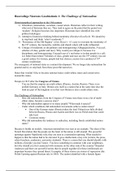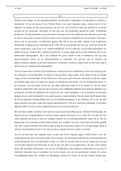Hoorcollege Nieuwste Geschiedenis 1: The Challenge of Nationalism
Historiographical approaches to the 19th century
1) Liberalism, nationalism, socialism, conservatism. Historians reflect in their writing
what sort of historian they are. They tend to agree on the point that the period was
‘modern’. Religion becomes less important. Historians have identified less with
political ideologies
2) Attempt to historicise thinking behind modernity (Reinhart Koselleck). We should try
to step back and think ‘what’s modernity’?
3) ‘Persistence of the Old Regime’ (Arno Mayer) – it’s easy to overstate the modernity of
the 19th century, the monarchy, nobility and church where still really influential.
4) Critique of modernity as disciplinary and homogenising (Alltagsgeschichte, Foucault,
scholars of class, gender and race). Why would you critique it; because it is
disciplinary and homogenising. Foucault says it’s not better to isolate people in a cell;
is it better than torture? Scholars of class, gender and race say the 19th century was not
a good century for women, people had less choices, racism was a product of 19th
century modernism.
The emergence of national states as a natural development. We no longer take nationalism for
granted and try to step back from these powerful narratives.
States that wouldn’t like to become national states: multi-ethnic states and conservative
monarchic states.
Europa in 1815 after the Congress of Vienna
- You see that the empires are multi-ethnic (Prussia, Austria, Russia). There is no
unified Germany or Italy. Britain sees itself as a nation but at the same time also the
Irish are part of the kingdom so in that view Britain is also a multi-ethnic state.
The Challenge of Nationalism
- How did nationalism, from the Congress of Vienna were there were a lot of multi-
ethnic states, become a success story?
- Why did nationalism appeal to so many people? What made it special?
- Under which conditions did nationalism movements achieve nation states?
One of the German states (Prussia) takes the lead. Poland was fully divided
between Russia, Prussia and Austria and there was no Polish state that could
take lead.
Common enemy
- Why did nationalism the tendency to radicalise, including firmly established nation
states?
Because it builds on models. American nationalism was seen as an example. The ideas of the
French Revolution that the people are the heart of the nation is still around. The powerful
uprisings against Napoleonic rule; they are seen as a nationalist uprising. What needed to
happen is that the nation had to be elevated. It gave intellectuals a key role (writers, the press,
school teachers, academics, university students). There is a norm that you should identify with
millions of people you don’t know. You have something in common with your neighbours,
but why should you feel connected with someone on the other side of the country? Benedict
Anderson said there are powerful stories that tie people together (for these intellectuals are
important because they spread them). Examples of these stories are stories of repression (the
Polish Uprising against Russian rule in 1863). The nation identified with a female figure
,(Polonia). The idea that progress required a national framework; that it needed to be on a
national scale, that there had a same language. ‘Algemeen beschaafd Nederlands’ is
something invented in this period; everyone in the country had to understand each other.
Railways were also a thing to tie the nation together. So, the nation became an ordinary thing
that the more intellectual people can experience in their everyday life. History became
important; you can see it in statues and monuments. Eric Hobsbawm spoke of invented
traditions (Scottish folklore is really a 19th century invention). Statues and monuments appeal
to romanticism and rationalism. Nationalism offered something for women; female figures,
the idea of motherhood, elementary school teachers that teaches the nation.
So, explaining nationalism’s plausibility
- ‘Imagined community’, ‘invented traditions’; powerful stories of sacrifice,
achievement, glory that brought citizens together
- Emotional, religious, backward-looking and rational, practical, forward-looking
- Attractive, academics, journalists, also of lawyers, engineers and businessmen
In 1914 there were still multi-ethnic states (Austria-Hungary, Russia, Poland and Ireland are
still not independent). Changes were made in Germany, Italy and Belgium. Nationalism was
difficult to accomplish if there is no monarchical state. Italy was complex because they got
lots of help from France and they also have a monarchy that takes lead (Piedmont). In
Germany we have Prussia. One takes lead and have an army to provide. The Irish have no
outside force that helps them.
Uprisings didn’t really have a lot of international sympathy, you see that in Poland and
Ireland; they get no help from outside; no one gets in war for them. Giuseppe Garibaldi was a
romantic figure. He enters Italy and wins from an army of Sicilians and goes to Naples. He is
followed by the press.
Italian unification, 1859 – 1870
- Movement (Risorgimento), in conjunction with leadership by Piedmont-Sardinia
(Camillo di Cavour) and support by Napoleon III’s France
- In 1848/49 failure, but military victory against Habsburg Empire (1859) and
successful uprising against Kingdom of Two Sicilies (1860)
- Italian Kingdom wages a further war against the Habsburg Empire, adding Venice
(1866), and conquered Papal States
German unification, 1864 – 1871
- Movement, at odds with Prussia but eventually collaborating with chancellor Otto von
Bismarck
- Victory of Prussia and Austria against Denmark added territories (1864)
- Prussia won war against Austria (1866), leading to annexations and North-German
Federation
- Victory against France (1870/71) brought in southern German states and led to
German Empire, at first a federation of monarchies
Why is Napoleon III involved twice? He intervenes in Italy and is provoked by Bismarck in a
war against Germany. Why does he do that? Napoleon III was a nephew op Napoleon I. He
has a big model to work up to (Napoleon I). He wants to prove that he is more than just a
‘little Napoleon’. He loses and its over because he has no monarchic dynasty; if he loses it’s
just over.
,From nationalisms to nation-states
- Nationalisms led to uprisings (Poland in 1830 and 1863, Ireland in 1867) and
contributed to revolutions (1848/49)
- But backing but monarchical states needed, either from outside (France for Italy,
several for Greece) or inside (Prussia, Piedmont-Sardinia)
- New nation-states represented compromises between conservatives and liberals
(Germany) or liberals and revolutionaries (Italy)
Max Weber was a diehard German nationalist. He sees it as a starting point for something
bigger. In the 19th century there is a tendency to take nationalism further. Nationalism
becomes popular in more ways; military, journalism, racist thinking. ‘We need to strengthen
our race’. Socialism is a challenge to nationalism, also individualism is a challenge.
Nationalist states need an enemy; they either have one or find one. Challenges are anticolonial
nationalisms challenge imperial nationalism around 1900. As a result, we have a strong
emphasis on homogeneity. The Jewish minority wanted to be part of these nationalism; they
wanted to be French of German. Nation states often guaranteed Jewish emancipation; full
civil rights, move where they want. But this was not universally accepted. Some nations
argued that Jews not belonged in their nations. They say that Jews can adapt to the nation but
still have their own ideas. There are still a lot of pilgrims against Jews, especially in Russia.
Liberal Jews want to fit in, orthodox Jews tend to migrate to Jewish neighbourhoods. Dreyfus
was a Jewish officer in France accused of spying for the Germans; but it came out that he was
innocent but was blamed because he was Jewish. It rose a controversy in France; defenders
(France as the country of human rights) but also people who blamed him because he was
Jewish. Zionism is a nationalism idea for Jews. The idea was that the nation states in Europe
did not accept Jews so that they had to build their own nation states. Zionism was a sort of
reaction against anti-Semitism and not fitting in in Europa
Consequences of nationalism within nation-states
- Strong pressure never to stand still, to be more nationalist, to strengthen the nation
- External dimension (assertiveness against competing nationalism, quest for imperial
power)
- Domestic dimension (quest for homogeneity, against socialist internationalism and
minorities, especially Jews)
Conclusion
Nationalism was not especially modern, but a way to look forward but also backward.
Looking back and telling a nationalist story. National movements were powerful, but they
needed the power of monarchical states to reach their goal. But still they were not satisfied.
They wanted to take nationalism further. 19th century nationalism was influential. In order to
understand present day issues it is useful to look to 19th century nationalism.
, Hoorcollege 2: class and civil society 4/4/2019
Key question’s
1) How did Marx understand class society, and Tocqueville civil society?
2) Was Marx ‘right’ about industrialization, the bourgeoisie and the working class?
3) Was Tocqueville ‘right’ about associational life and civic activism?
4) How were civil society and class society related?
Karl Marx (1818 – 1883)
- A radical writer. He made himself unpopular in the Prussian state, so he went to exile
in Paris
- Émigré in Paris, Bruxelles and London
- Critic of class society and the bourgeoisie. He was the son of a bourgeoise. He defined
it that it had ownership over the means over production (factories). He saw that the
bourgeoisie had replaced the nobility. He was not a conservative. He did not just say
that the bourgeoisie was bad. It was good in that it was a historical necessity, but he
also said that there is a next stage that produces a working class that are no longer
connected to the product they make (only one part of the production product). After
the bourgeois revolution comes the socialist revolution
- Prophet of communism
Besides industrial cities, capital cities also grew (Barcelona). Some see the industrial
revolution as a process because it lasted 200 years. It was early in England and Belgium, but
not everywhere as early.
The nobility was based on birth. The bourgeoisie saw the nobility as lazy and not useful. The
upper middle class liked strict states with police officers. They liked the idea that the vote of
the middle class counted less. Someone who was educated and had property should
legitimately have more to say than someone who owns nothing at all. Historian focus on the
economic side (who owns the means of production). But the lawyers, doctors, professors did
not own the means of production. They were more united by cultural values (family). The
funny thing was that Marx was a middle class himself.
Marx looked beyond his own time. At the time of writing artisans were still working in
factories. They were prominent because they came under pressure and work through their
own workshop. Many artisans among the democrats and left-winged politicians. Most people
moved to the city from the countryside for the better living standard. Socialist parties were
growing. They read a lot of Marx. The problem was that society did not develop along Marx’
lines. There were workers who earned more. The trade unions that developed were more
pragmatic; not into a violent overthrow of society. Another development was that the working
class always grew. Many people become office workers, something Marx did not predict.
Also, the same with service workers (hotel workers etc.). The working class was united but
there were lots of culturally different among them (catholic and protestant workers).
Marx’ diagnosis of his society in the light of recent historiography (summary of the above)
- Industrialization stunning, but more gradual and uneven than Marx suggested
- Bourgeoisie: growing in importance, demarcated from workers, but more diverse and
more culturally defined
- Working class: was socially and politically diverse and did not become poorer across
the board, ‘white-collar workers’ emerged





